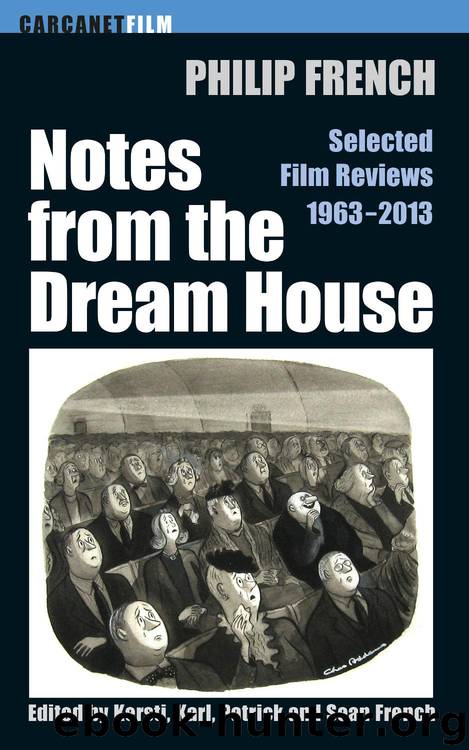Notes from the Dream House by French Philip; French Kersti; French Karl

Author:French, Philip; French, Kersti; French, Karl [Philip French]
Language: eng
Format: epub
ISBN: 5510616
Publisher: Carcanet
Published: 2018-03-08T16:00:00+00:00
Once Were Warriors (Lee Tamahori)
The Observer, 16 April 1995
Lee Tamahori’s Once Were Warriors opens on an idyllic New Zealand landscape, a crystal lake beneath imposing snow-capped mountains. This clichéd tourist-office image of the country seems strangely still, almost surreal. The camera then pans to the left, revealing that it isn’t a real landscape. It’s a picture on a billboard beside a bustling urban motorway that carries noisy, polluting traffic through a depressed Maori ghetto in Auckland, the country’s largest city. What we are to be shown by Tamahori and his screenwriter, Riwia Brown (she’s adapted Alan Duff’s novel), is a New Zealand that lies behind the official face presented to the world.
In the opening reel, the film vividly introduces, first separately, then together, the eight members of the Heke family – déracinés working-class Maoris – and locates them in a shoddy milieu vibrant with a danger bred of desperation. They are the imposing, macho Jake (Temuera Morrison), who’s just lost his dead-end job; his handsome wife Beth (Rena Owen); and their five children, two of them infants, the other three teenagers – Gloria, a beautiful thirteen-year-old with literary gifts, and her elder brothers, the surly, forceful Nig, and the withdrawn Boogie, both running with street gangs. Like members of many native populations, American Indians for example, and Australian aboriginals, they have lost touch with their traditional culture without being assimilated into the world of those who dispossessed them. This harsh, almost unbearably painful picture never sentimentalises their situation.
For sixteen years Jake and Beth have cheerfully muddled by. She has put up with his fecklessness and violence, because she loves him and cannot resist his sexual magnetism. There is also her pride. It transpires that Beth is from a regal Maori family and Jake from the former slave class. When she left her tribal settlement to marry him, her parents predicted disaster, and she has been determined to prove them wrong. But this classically hypergamous relationship has bred resentment in Jake and been an additional factor in his disturbed personality. He becomes increasingly abusive towards his wife and children, and a series of crises culminates in tragedy, forcing Beth to desert him and reclaim her ethnic identity.
The brutal, irresistible Jake, boozing with his mates, bringing them home to disrupt the household, is an unromanticised version of Tennessee Williams’s Stanley Kowalski. Indeed, there’s a close resemblance between A Streetcar Named Desire and Once Were Warriors, including a major theme of the rape and destruction of innocence. But this is Streetcar seen from the wife’s point of view, and while it isn’t a feminist tract, Beth is presented as a strong, long-suffering woman. Having sacrificed everything to hold the family together, she finally recognises limits to what she should endure. It is her character and behaviour that turn a potentially dispiriting picture into an affirmative experience.
On the other hand, however appalling and inexcusable his actions, Jake emerges as a pathetic, frustrated victim, incapable of understanding and transcending the conditions that have shaped him.
Download
This site does not store any files on its server. We only index and link to content provided by other sites. Please contact the content providers to delete copyright contents if any and email us, we'll remove relevant links or contents immediately.
The Kite Runner by Khaled Hosseini(4963)
Gerald's Game by Stephen King(4386)
Dialogue by Robert McKee(4178)
The Perils of Being Moderately Famous by Soha Ali Khan(4071)
Story: Substance, Structure, Style and the Principles of Screenwriting by Robert McKee(3334)
The 101 Dalmatians by Dodie Smith(3317)
The Pixar Touch by David A. Price(3226)
Confessions of a Video Vixen by Karrine Steffans(3110)
How Music Works by David Byrne(2969)
Fantastic Beasts: The Crimes of Grindelwald by J. K. Rowling(2856)
Harry Potter 4 - Harry Potter and The Goblet of Fire by J.K.Rowling(2818)
Slugfest by Reed Tucker(2810)
The Mental Game of Writing: How to Overcome Obstacles, Stay Creative and Productive, and Free Your Mind for Success by James Scott Bell(2773)
4 - Harry Potter and the Goblet of Fire by J.K. Rowling(2542)
Screenplay: The Foundations of Screenwriting by Syd Field(2444)
Scandals of Classic Hollywood: Sex, Deviance, and Drama from the Golden Age of American Cinema by Anne Helen Petersen(2405)
Wildflower by Drew Barrymore(2384)
The Complete H. P. Lovecraft Reader by H.P. Lovecraft(2374)
Casting Might-Have-Beens: A Film by Film Directory of Actors Considered for Roles Given to Others by Mell Eila(2310)
